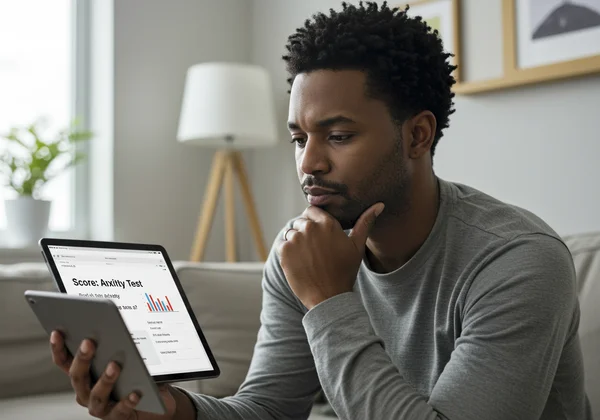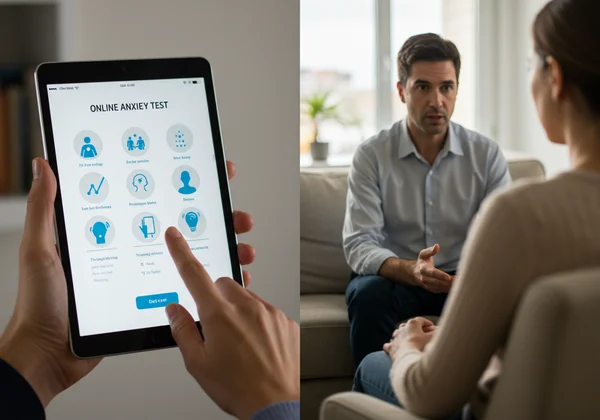High Anxiety Score? Next Steps After Your Anxiety Test
September 29, 2025 | By Isla Caldwell
Just received the results from your anxiety test and feeling a bit overwhelmed, especially if your score was high? It's completely normal to feel a mix of emotions—confusion, concern, or even a sense of validation. How can I test myself for anxiety? You've already taken a courageous first step by seeking insight, and this article is your compassionate guide to understanding what your anxiety score means and the proactive steps you can take next. Remember, an online screening like the one at AnxietyTest.me is a powerful starting point, not a final destination. Understanding your results is the first move toward empowered self-awareness and better mental well-being.

Interpreting Your Anxiety Test Score
Receiving a number that quantifies your feelings can be jarring. You might be wondering what that score really says about you and how it fits into the bigger picture of your mental health. Let’s break it down into manageable, understandable pieces, distinguishing between what a screening tool can tell you and where a professional's expertise becomes essential. Gaining this clarity is essential for confidently moving past your fears.
What Does Your Anxiety Score Really Mean?
Think of your anxiety score as a snapshot, not a permanent label. It reflects the frequency and severity of the anxiety symptoms you’ve experienced recently, based on your answers to a scientifically validated questionnaire like the GAD-7. A higher score typically indicates that your symptoms are more frequent and intense, likely having a greater impact on your daily life. It doesn't define who you are; it simply provides an objective measure of what you're feeling right now. This data is incredibly valuable. It helps put a name to that vague 'not feeling right' and gives you something tangible to work with. Think of it as a signpost guiding you towards areas that need attention. Our unique AI-powered insights can then take it a step further, offering deeper, personalized analysis into your unique challenges and strengths.

Online Screening vs. Professional Diagnosis: Key Differences
It's crucial to understand the distinction between a screening tool and a clinical diagnosis. An online anxiety test is an excellent, confidential way to screen for symptoms of anxiety. It's designed to raise your awareness and help you decide if further steps are needed. However, it cannot replace a comprehensive evaluation by a qualified healthcare professional. A formal diagnosis involves a much deeper conversation with a doctor or therapist who can consider your full medical history, life circumstances, and other factors that a questionnaire cannot capture. Our test is a reliable first step, but a professional can provide the definitive diagnosis and personalized treatment plan you may need.

Knowing When to Seek Professional Support for Anxiety
One of the most common questions after getting a high score is, "Is this serious enough to see someone?" The answer often lies in how much your symptoms are affecting your quality of life. Recognizing the line between everyday stress and a persistent anxiety issue is the next crucial step in your journey. Let's explore the signs that indicate it’s time to reach out for professional support.
Recognizing Persistent Anxiety Symptoms and Their Impact
Are your feelings of worry or dread constant? Do they feel uncontrollable? If your symptoms are persistent and interfere with your work, relationships, or ability to enjoy life, it's a clear signal to seek help. Pay attention to physical symptoms like a racing heart, shortness of breath, or stomach issues. Notice emotional signs such as irritability or a constant sense of being on edge. Cognitive impacts, like difficulty concentrating or racing thoughts, are also important indicators. If these experiences have become your "new normal," it’s time to talk to someone who can help you find your way back to balance.
Overcoming Doubts and Stigma Around Getting Help
For many, the biggest hurdle isn't recognizing the problem but overcoming the hesitation to seek help. You might worry about being judged, labeled, or seen as weak. Please know this: seeking support for your mental health is a profound act of strength and self-care. It's no different than seeing a doctor for a physical ailment. Professionals in this field are bound by strict confidentiality, creating a safe and non-judgmental space for you to share your experiences. Taking a confidential assessment was a private step, and seeking professional help maintains that same level of privacy.

Exploring Your Options: Pathways to Professional Help
So, you’ve decided it’s time to talk to someone. What does that actually look like? The path to professional help is more accessible than many people realize, with several entry points available. From your family doctor to a specialized therapist, there are trained professionals ready to support you. The key is finding the right person and the right approach that makes you feel comfortable and understood.
Starting the Conversation: Talking to Your Primary Care Doctor
A great first stop is often your primary care doctor or general practitioner (GP). They are trained to discuss mental health concerns and can be an invaluable ally. Your doctor can help rule out any underlying medical conditions that might be contributing to your anxiety symptoms. They can provide initial guidance, discuss treatment options, and offer a referral to a mental health specialist, such as a psychologist or psychiatrist, if needed. Starting with a trusted doctor can make the process feel less intimidating.
Understanding Therapy Options: CBT, DBT, and More
Therapy, or psychotherapy, is one of the most effective ways to manage anxiety. There are many different approaches, but one of the most well-researched is Cognitive Behavioral Therapy (CBT). CBT helps you identify and challenge negative thought patterns and behaviors that fuel anxiety, and it teaches you practical coping skills. Other effective methods include Dialectical Behavior Therapy (DBT) and Acceptance and Commitment Therapy (ACT). A therapist will work with you to determine the best approach for your specific needs, equipping you with lasting tools to manage anxiety.
How to Find the Right Mental Health Professional for You
Finding a therapist you connect with is vital for success. Start by asking your doctor for a referral or checking with your insurance provider for a list of in-network professionals. Online directories from professional organizations can also be helpful resources. When you contact potential therapists, don't be afraid to ask questions. Inquire about their experience with anxiety, their therapeutic approach, and their fees. Many offer a brief initial consultation for free. The goal is to find someone you feel comfortable and safe with—this therapeutic relationship is the foundation of your progress.
Your Journey Towards Managing Anxiety Starts Now
A high anxiety score can feel scary, but it's really a moment of clarity—a chance to take meaningful action. You've already done the hard part by looking inward. Now, you have information and a clear path forward. This journey is about learning, growing, and building resilience. Your score is just a starting point. The steps you take next are what truly define your path to managing anxiety and reclaiming your peace of mind. Why not revisit your results or explore the AI-powered insights on our site as you consider your next move?
Frequently Asked Questions About Anxiety Test Results & Next Steps
What should I do if my anxiety score is high?
A high score is a signal to pay closer attention to your mental health. The first step is to not panic. Use the result as motivation to learn more about anxiety, explore self-help coping strategies, and strongly consider scheduling a conversation with a primary care doctor or a mental health professional to discuss your results.
How accurate are online anxiety tests like this one?
Our online test is based on the GAD-7, a scientifically validated and widely used screening tool. It is highly reliable for identifying symptoms of anxiety and their severity. However, while it is accurate as a screening instrument, it is not a substitute for a formal diagnosis from a healthcare provider.
Can an online test replace a formal anxiety diagnosis from a doctor?
No, an online test cannot replace a formal diagnosis. A doctor or therapist conducts a comprehensive evaluation that considers your unique personal and medical history. An online tool like our free anxiety test is an excellent resource for self-assessment and a great starting point for a conversation with a professional.
Do I have anxiety, or am I just experiencing stress?
Stress is typically a response to an external trigger (like a work deadline) and subsides once the trigger is gone. Anxiety is more internal and can persist even without an obvious stressor. It often involves excessive worry about the future that feels difficult to control. If worry and physical symptoms are persistent and impact your life, it may be more than just stress.
Disclaimer: This article is for informational purposes only and does not constitute medical advice. Our test is a screening tool, not a diagnostic instrument. Please consult a qualified healthcare professional for any health concerns or before making any decisions related to your health or treatment.